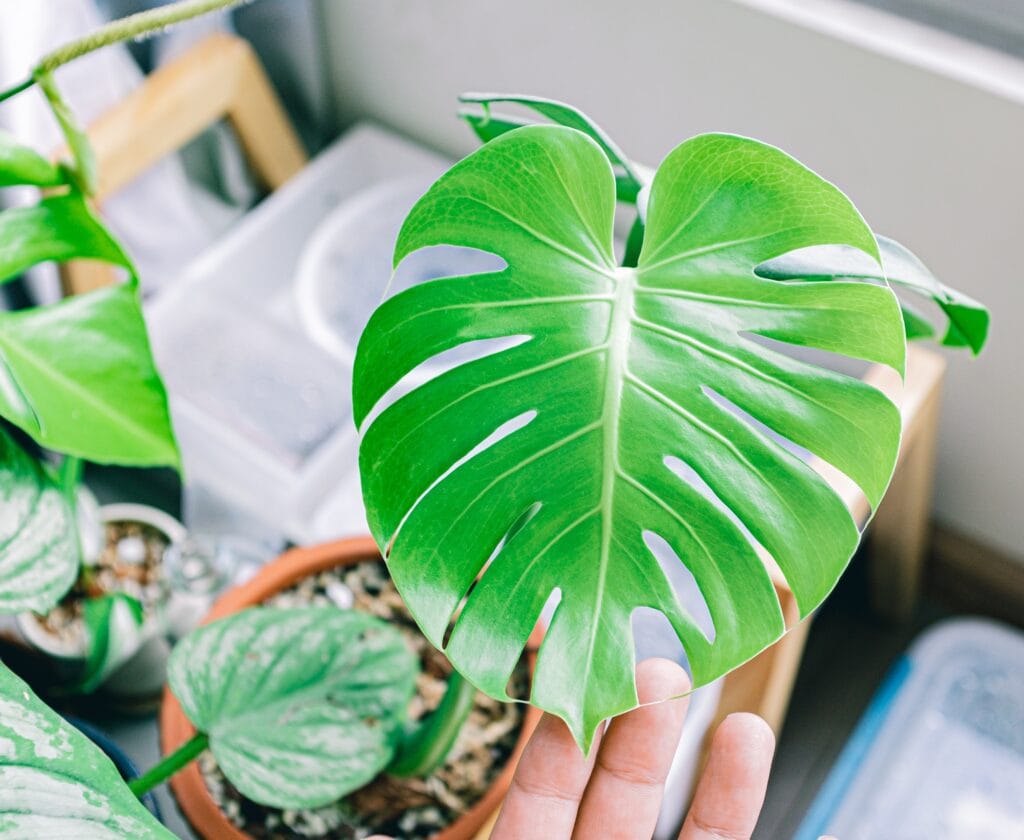The lush, split leaves of the Monstera plant have become a staple in modern homes. Their unique design and tropical vibe have made them a beloved choice for both plant enthusiasts and interior designers. But as their popularity soars, a pressing question emerges: can monstera cause allergies?
While these plants undeniably add aesthetic appeal, it’s essential to understand their potential impact on our health.
In this article, we’ll unravel the relationship between Monstera plants and allergies.
You’ll gain insights into:
- The nature of Monstera-induced allergic reactions.
- How to identify and manage these allergies.
- Tips to safely enjoy the beauty of Monstera in your living spaces.
- Join us as we dive deep into the world of Monstera and its potential effects on our well-being.
Monstera: A Brief Overview
Monstera, often referred to as the “Swiss cheese plant” due to its distinctive split leaves, originates from the tropical rainforests of Central America. Its ability to thrive in indoor conditions, coupled with its striking appearance, has cemented its place in homes and offices worldwide.
Beyond its aesthetic appeal, Monstera is known for its rapid growth and adaptability. It can flourish in various lighting conditions, from bright indirect light to low light spaces, making it a versatile choice for interior decor.
However, as with many plants, there’s more to Monstera than its decorative value. Its interaction with our health, particularly in relation to allergies, is a topic of growing interest. As we continue, we’ll delve into the question: can monstera cause allergies and what that means for plant lovers.
Can Monstera Cause Allergies?
Yes, like many plants, Monsteras release compounds that some individuals might be sensitive to, leading to allergy-like symptoms. While Monstera plants are a visual treat, they can, in some cases, be a cause for concern when it comes to allergies.
Here are some points to consider:
- Skin Contact: Some people might experience skin irritation or rashes upon touching the plant. This is often due to the sap, which can contain irritants.
- Ingestion: While Monstera is not typically consumed, it’s worth noting that the plant can be toxic if ingested. This can lead to symptoms like mouth irritation or stomach upset.
- Airborne Allergens: While less common, it’s possible for the plant to release airborne allergens, especially when disturbed or during repotting.
If you or someone in your household starts showing allergic reactions and you suspect the Monstera might be the cause, it’s essential to get clarity. An allergy skin test can help determine if the Monstera plant is the allergen source.
How to Identify if you are Allergic to Monstera
Recognizing the signs of an allergy is the first step towards addressing it. When it comes to Monstera allergies, the symptoms can vary based on the type of exposure:
Skin Reactions
Direct contact with the plant, especially its sap, can lead to:
- Redness or rash
- Itching or burning sensation
- Blisters in more severe cases
Inhalation Symptoms
Breathing in allergens from the plant might result in:
- Sneezing or nasal congestion
- Itchy or watery eyes
- Difficulty breathing in extreme cases
Ingestion Symptoms
If any part of the plant is accidentally consumed it can cause a variety of symptoms like:
- Swelling of the lips, tongue, or throat
- Nausea or vomiting
- Abdominal pain
If you observe any of these symptoms and suspect a link to your Monstera plant, it’s crucial to take action. A definitive way to confirm the allergy source is through an allergy skin test. This test can pinpoint the exact allergens causing the reaction, allowing for informed decisions on management and treatment.

Managing and Treating Monstera Allergies
If you’ve identified that your Monstera plant is causing allergic reactions, don’t panic. There are several steps you can take to manage and treat the symptoms:
- Consider moving the Monstera plant to an area where there’s limited contact, like a room that’s less frequented or even outside if the climate permits.
- If you need to handle the plant, especially during repotting or pruning, always wear gloves to prevent direct skin contact with the sap.
- Using air purifiers can help reduce airborne allergens, ensuring cleaner air in rooms where plants are kept.
- Over-the-counter antihistamines can provide relief from mild allergic reactions. However, always consult with a healthcare professional before starting any medication.
- If symptoms persist or are severe, it’s essential to consult with an allergist. They can provide guidance on managing the allergy and might recommend treatments like the allergy skin test to further understand the triggers.
Remember, while Monstera plants are beautiful, your health comes first. With the right precautions and awareness, you can enjoy the beauty of the plant without compromising your well-being.
Prevention Tips for Monstera-Related Allergies
While it’s essential to know how to manage and treat Monstera allergies, prevention remains the best strategy. Here are some proactive measures to ensure you can enjoy the beauty of your Monstera plant without the worry of allergic reactions:
Regular Cleaning
Dust and allergens can accumulate on the leaves. Wipe the leaves with a damp cloth periodically to keep them clean.
Limit Direct Contact
If you’re sensitive, avoid touching the plant directly. When handling it, always use gloves.
Educate Household Members
Ensure everyone in the household is aware of the potential allergenic properties of the plant, especially children who might be curious.
Safe Placement
Keep the plant in a location where it’s less likely to be disturbed frequently, reducing the risk of releasing allergens.
Monitor Health
Stay vigilant about any changes in your health or symptoms that might indicate an allergic reaction.
By adopting these preventive measures, you can create a harmonious environment where both you and your Monstera plant thrive.
Conclusion
Monstera plants, with their captivating design, have earned their place in the hearts of many. But as with many things in life, it’s essential to strike a balance between beauty and well-being.
If you or a loved one are experiencing symptoms or suspect that a Monstera plant might be causing allergies, it’s crucial to seek expert advice. At Arizona Allergies Associates, our dedicated team of specialists is ready to assist. Don’t let plant allergies diminish your quality of life; explore our range of services and take the first step towards a healthier, allergy-free environment.



